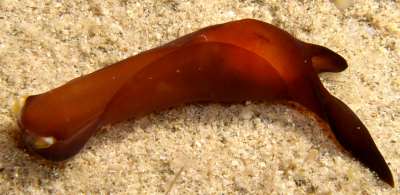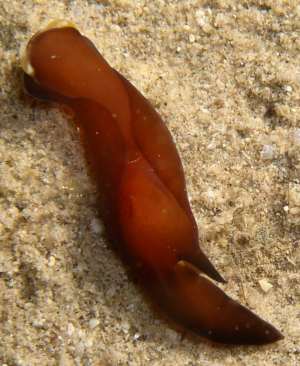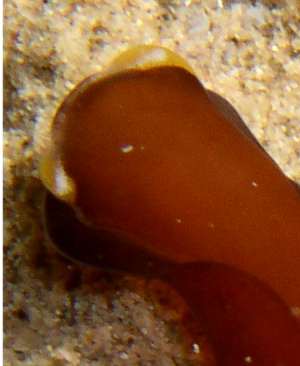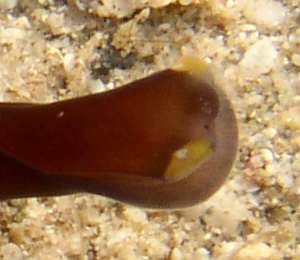Re: Chelidonura flavolobata - color variation
March 19, 2005
From: Oren Lederman

Hi Bill,
In the last month or two I've been seeing lots of these nudis. and I mean lots (i actually stopped taking photos of them...). Next time I dive in the red sea will be in a month or so, but if there's something in particular that you wish to try and find out about them let me know and i'll pass it to the other members of the local seaslug forum :-)
I'm also sending you a few more photos of this nudi with a light-brown body.
Also, i'm pretty sure i once took a photo of a black-body-completely-white-lobes Chelidonura flavolobata. i'll try and look it up.
Locality: "Dekel" beach, Israel, Red Sea. Depth: ~20 m. 29 Sep 2004. sandy. Photographer: Oren Lederman
Oren
lederman@bigmail.co.il



Dear Oren,
I'm glad I encouraged you to send a few more photos. If you look at the close-up of the head alongside you may be able to see a faint black line along the edge of part of the right yellow lobe. If you have a look at Harro Quitzau's earlier photo of a black form [#10244], this black line is very clear. It's a pretty good link between the brown and black colour forms. If you are going Chelidonura 'hunting' soon it would certainly be worth seeing if you can get the two colour forms to mate with each other, and perhaps you could see if there is any correlation with the background colour of the environment in which they are found. The brown ones seem, from the photos, to be on white coral sand, while the black ones seem to be associated with patches of live coral. I know it would need statistical tests to get a scientifically sound answer, but it would be interesting to see if you and your 'local seaslug forum' can notice anything. Of course I am always waiting for records of these animals feeding. All indications suggest species of Chelidonura feed on flatworms, but a few more actual sightings wouldn't go astray.
One other interesting point I noticed in one of your photos [lower right in your message] are the sensory bristles these animals use to search for their prey. They apparently sense chemicals in the mucus trails of their prey. They can be clearly seen along the front edge of the head.
Best wishes,
Bill Rudman
Related messages
-
Eggs of Chelidonura flavolabata
From: Lior Harari, March 29, 2007 -
Chelidonura flavolobata from the Red Sea
From: Kamal El Tawil, May 17, 2006 -
Chelidonura flavolobata - extreme close up
From: Oren Lederman, March 9, 2006 -
Black Chelidonura flavolobata with white lobes
From: Oren Lederman, March 19, 2005 -
Chelidonura flavolobata - color variation
From: Oren Lederman, March 17, 2005 -
Chelidonura flavolobata from the Red Sea
From: Oren Lederman, March 9, 2005 -
Chelidonura flavolobata from Egyptian Red Sea
From: Michael Mrutzek, January 4, 2005 -
Chelidonura flavolobata from the Red Sea
From: Harro H. Quitzau, July 2, 2003 -
Chelidonura flavolobata from Red Sea [2]
From: Nils Anthes, May 31, 2003 -
Chelidonura flavolobata & C. inornata
From: Bill Rudman, May 31, 2003 -
Chelidonura flavolobata from Red Sea [3]
From: Nils Anthes, May 31, 2003 -
Chelidonura flavolobata from Red Sea [1]
From: Nils Anthes, May 28, 2003 -
Chelidonura flavolobata from Egypt
From: Marina Poddubetskaia, March 12, 2003 -
Re: Chelidonura flavolobata from Red Sea
From: Marina Poddubetskaia, April 21, 2002 -
Chelidonura flavolobata from Red Sea
From: Marina Poddubetskaia , April 16, 2002 -
Chelidonura flavolobata from Saudi Arabia
From: Gordon T. Smith, January 30, 2001 -
Chelidonura flavolobata from Red Sea
From: Erwin Koehler, January 22, 2001
